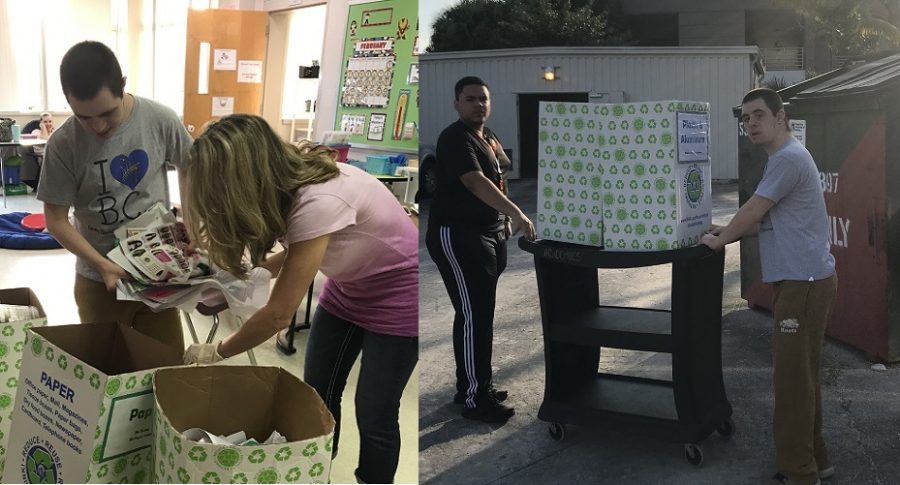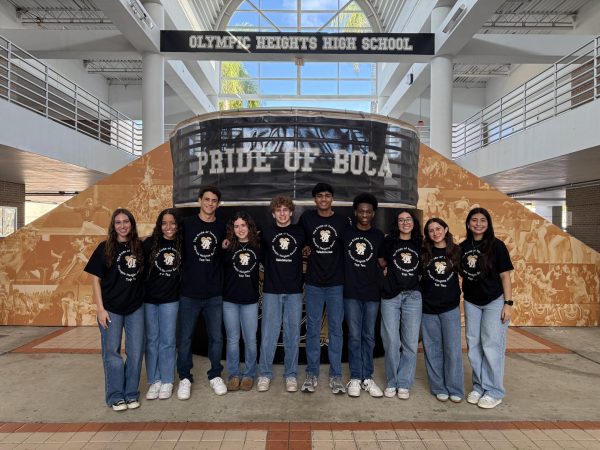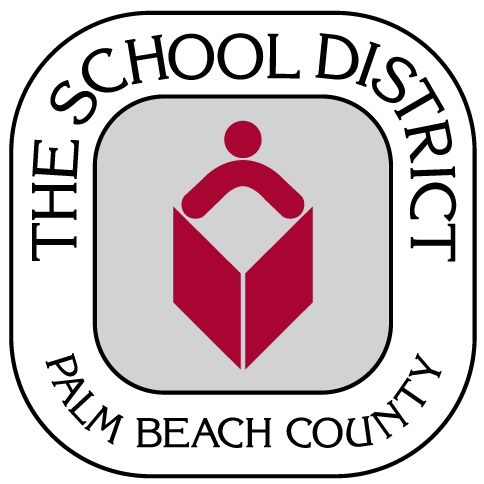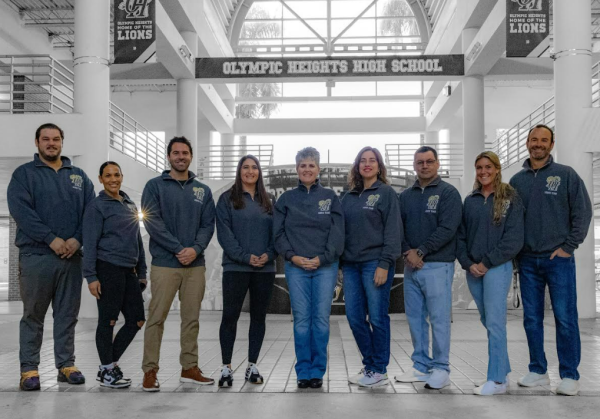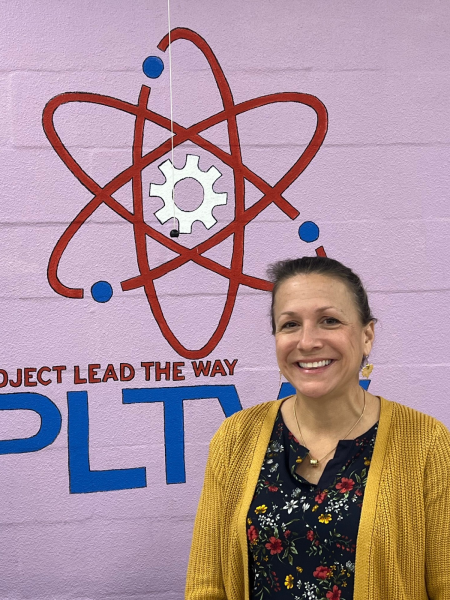As many communities struggle with recycling, Palm Beach County and Olympic Heights keep going strong
Ms. Lori Niemann (right) and Bentzy of the Olympic Heights Autistic Spectrum Disorder Unit sort through the paper recycling cartons to remove the un-recyclable items. Then, ASD Unit paraprofessional Mr. Kiefer and Bentzy take the paper to the recycling bins behind the cafeteria.
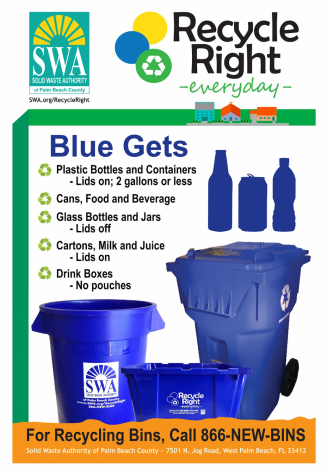 Over the past year, headlines have frequently proclaimed the “death of recycling” in America. This disheartening forecast sparked concern that the things we put in recycling bins don’t actually get recycled, as cities are finding themselves overwhelmed with recycling they are unable to process. What may come as a surprise is that the cause of this “recycling crisis” is a Chinese policy.
Over the past year, headlines have frequently proclaimed the “death of recycling” in America. This disheartening forecast sparked concern that the things we put in recycling bins don’t actually get recycled, as cities are finding themselves overwhelmed with recycling they are unable to process. What may come as a surprise is that the cause of this “recycling crisis” is a Chinese policy.
The issue arose in 2018 when China cracked down on the importation of foreign garbage with the implementation of its so-called “National Sword” policy. For many years, America has been highly reliant on outsourcing its recycling to Asia. According to the Sierra Club, “US cities and trash companies started offshoring their most contaminated, least valuable ‘recyclables’ to a China that was desperate for raw materials” in 1992. Extremely lax environmental controls in China allowed for the improper processing of plastic and contributed to significant pollution.
Meanwhile, America’s domestic industry deteriorated from disuse, leaving us with a country that is essentially unable to sort, clean, and recycle its own trash. Steve Alexander, president of the Association of Plastic Recyclers, asserts that “we’re trying to deal with a 21st-century packaging stream based on 20th-century infrastructure.”
So when China stopped taking U.S.recycling, many American cities were left with massive heaps of low-quality recyclables they were unable to process. Some places increased trash-collection fees while others cut recycling programs altogether. For instance, Prince George’s County, Maryland, went from earning $750,000 in 2017 for its recyclables to losing $2.7 million in 2018 to get rid of them. Portland began sending its excess recyclables to the landfill, while Philadelphia used waste-to-energy plants to incinerate the trash.
Here in Palm Beach County, residents’ recycling is handled by the Solid Waste Authority (SWA). Palm Beach County owns two Renewable Energy Facilities and uses a waste-to-energy program. The SWA claims its Renewable Energy Facility 2 (REF2) is “the most advanced and cleanest waste-to-energy power plant in North America.”
Unlike REF1, which transforms post-recycled municipal solid waste into refuse-derived fuel, REF2 is a mass burn facility. The SWA believes 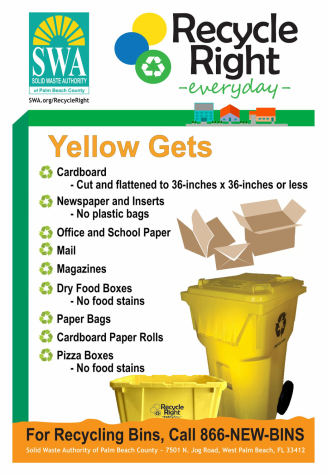 REF2 will “reduce the amount of waste going to SWA’s landfill by up to 90 percent.” It also generates 100 megawatts of electricity for Palm Beach County, enough electricity to provide power for all the homes in Boca Raton!
REF2 will “reduce the amount of waste going to SWA’s landfill by up to 90 percent.” It also generates 100 megawatts of electricity for Palm Beach County, enough electricity to provide power for all the homes in Boca Raton!
Although Palm Beach County may not be struggling to keep up with recycling as much as other areas of the country are, China’s ban did not leave the county unaffected. The Boca Raton Tribune wrote that as industry shipments to China decreased, shipments to India, Vietnam, and Indonesia increased substantially. The SWA “also ships to South America, Mexico and South Korea.”
Meanwhile, the recycling program here at Olympic Heights is on the rise, with science teacher Mr. Larry Korn calling it “the best it has ever been.” This is in large part thanks to Ms. Lori Niemann and OH’s students in the Autism Spectrum Disorder (ASD) Unit. Niemann says that the ASD unit has decided to take on this responsibility because they “wanted to find jobs [the] students could do around the school for vocational training.” The benefit is therefore twofold as they are helping their students learn skills and helping the school.
At the beginning of the school year, teachers were given bins for paper recycling in their classrooms. The ASD students have diligently been going around and emptying the bins every week, according to the following schedule: Monday – 1000 Building, Tuesday – 2000 Building, Wednesday – 3000, 4000, & 5000 Buildings, Thursday – 6000 Building, and Friday – 8000 Building. The recycling then comes back to the ASD classrooms where it is cleaned and sorted out, and finally taken to the large recycling bins in the back of the school.
But where does OH’s recycling go from there? Niemann explains, “The paper and cardboard bins are picked up by Zellwood Recycling. It gets processed in Zellwood and most of it stays in Florida. Some goes out of state.” The facility in Zellwood/Orlando, along with facilities in Clearwater and Fort Pierce, is part of a company called Recycling Services of Florida. The company’s website states that it services churches, schools, non-profits, and commercial businesses. They offer a free paper recycling program called Paper Retriever in which paper gets picked up and “is directly recycled back into newsprint, tissue and paper within a couple months of it being collected.” Schools such as our own can thus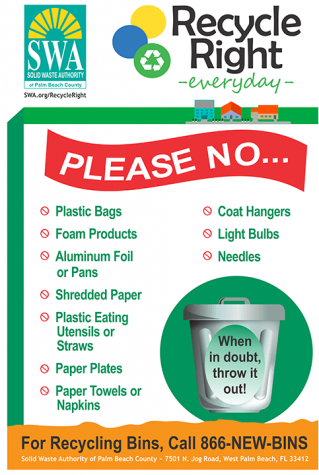 earn some money for their paper recycling.
earn some money for their paper recycling.
Additionally, the Key Club at OH has been trying to tackle plastic recycling. They recently started an initiative to collect plastic recycling in the 8000 building by hanging bags made out of old t-shirts on teachers’ doors. This then gets collected every Thursday during lunch. Cassandra Vyazmensky, president of Key Club, asserts, “In years past, the job of collecting recycling has always been an issue. The ASD unit starting to collect paper recycling this year has done a lot for our recycling program. We are hoping to raise money to buy plastic recycling bins for the school.”
It is important to note that many items that might technically be recyclable do not get recycled because they are too costly. Plastic straws, grocery bags, eating utensils, and yogurt containers are some examples of things that are theoretically recyclable but can actually “jam machinery and lower the value of the profitably recyclable materials they are mixed with, like aluminum cans and clean paper,” according to the Sierra Club. Recycling is further hindered when it gets contaminated with trash, an issue prominent at OH.
Niemann emphasizes this, saying that she finds a lot of garbage in the paper recycling bins, including “tissues, paper towels, food, plastic bags, fake press-on nails, pens, pencils, etc.” This means that she and her students are left to sort out the trash, because otherwise “the recycling companies will not compensate us or be able to process the recycled items if they are contaminated with garbage or the wrong type of recycling.”
Besides being mindful of what they throw in the bins, OH students and staff could help improve the program by making sure to put out the recycling, as currently “only a few classrooms per day” remember to do so. Furthermore, Niemann is shocked when she sees the enormous mess inside and outside of the cafeteria after breakfast and lunch. “It is disheartening to see so much litter and waste. Many of the items can be recycled. Milk and juice cartons can be emptied and put in the paper recycling bins. Plastic water and drink bottles can go into the plastic recycling bins. However, styrofoam trays, plastic utensils, and napkins can not be recycled and should go in the garbage.”
Vyazmensky agrees that lunchtime is an issue, expressing that despite there being bigger blue bins for plastic recycling during lunch now, students continue to throw away plastic in the garbage. She also disapproves of our school’s use of styrofoam lunch trays. “I think our school should increase the education they provide on recycling and the funding for recycling. The school gets money for recycling, so they should put that money into buying bins, copy paper made out of recycled paper, and more earth friendly products and not foam lunch trays,” she states.
Lack of proper knowledge is certainly an obstacle, as many people are simply unaware of which items can be recycled and how to recycle properly. But unfortunately, there are also some people who just don’t want to put the effort into recycling. “It only takes seconds to dump out a bottle or container and put it in the correct bins. Those seconds can make a huge difference in how our world will look in the future,” Niemann emphasizes.
The School District of Palm Beach County appears to be on the right track in raising awareness, as it was named Recycle Florida Today’s “Environmental Steward of the Year” in June 2019. According to the District website, “Recycling has increased by approximately 1,000 tons in the District over the past three years through a variety of programs.” Furthermore, Florida is one of a handful of states currently considering joining the 10 states that have “bottle bills” which require refundable deposits on all single-use beverage containers. Bottle bills are the single most effective way of increasing recycling, so this would be great news. Hopefully there will continue to be such positive changes both locally and nationally in the near future.
Wondering if something is recyclable? Search the Solid Waste Authority Disposal Database at: www.swa.org/378/Is-This-Recyclable

